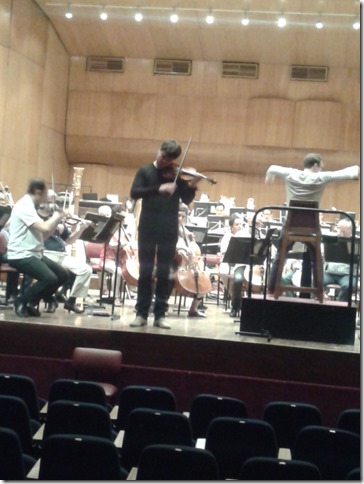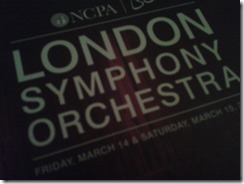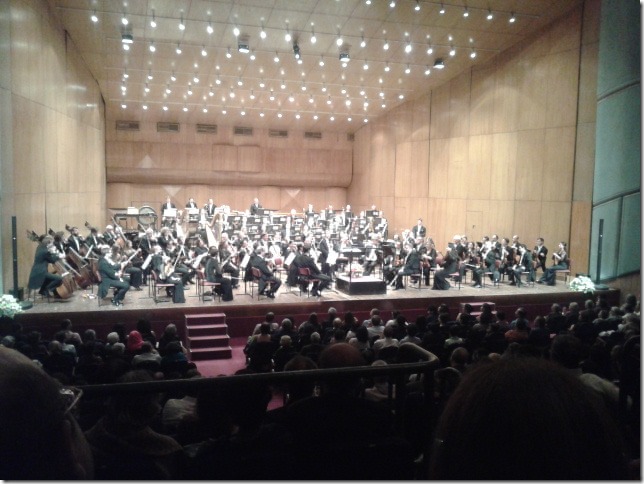As I wasn’t sure I’d get tickets to the LSO concerts, I had booked a ticket for the afternoon screening of Alexander Borodin’s opera Prince Igor from the Met Live in HD series.
I was just beginning to get absorbed in the opera when I had to tear myself away to go attend the LSO rehearsal.
I wish I had made better notes, and/or that I had blogged my thoughts ASAP after, because I am scrambling to remember salient points that struck me, and I know there were several.
I did however make notes during the pre-concert talk.
Conductor Daniel Harding (in conversation with Principal Flautist Gareth Davies) spoke for example of the danger of ‘knowing’ a piece before hand. He cited the example of listening as a child to his father’s record collection, which had Nathan Milstein playing the Tchaikovsky Violin Concerto, which obviously left a huge huge impression. He had heard it “hundreds of times, and knew it inside out.”
“But that’s quite dangerous, because what you know is what someone’s telling you about the piece.”
But, he says, “however wonderful it is, it isn’t the piece. The piece is what’s written down on the page…. In the end, the relationship has to be between yourself and what’s written on the page. And you allow these other things to inform you and inspire you, but you have to go to what’s written…. It’s very important to treat every time as fresh. There’s always be things you discover that you haven’t noticed before.”
“The greatest works have been played for hundreds of years, but still, their majesty remains something of a mystery. Nobody finds the answers. And the important thing is that we do not just churn out what we did the last time.”
Davies asked Harding what his experience was, playing the same piece with different orchestras.
“I think that music is something that happens between people.The great American conductor James Levine is a wonderful pianist, and he said how important it was for him always to have the piano, because however much it is a privilege, to stand in front of hundred players of the great orchestras, there are moments when you do want to sit by yourself in a room and make music on your own. But basically, music happens between people; it happens between the musicians, and it happens between us and you (the audience). It’s the thing of sharing. It’s the thing of hearing something in your imagination and finding it fascinating, finding it beautiful, and you want to recreate it in the real world, so that you can say to someone ‘Do you hear what I hear?’ In that sense playing a piece with a different soloist or with a different orchestra changes everything.”
“We all know soloists who travel the world playing the same piece week after week, and they insist that this orchestra play it the same way as the orchestra the week before. But the great musicians that we aspire to emulate are the ones who always listen to what they’re being offered, and react to it. Your ideas are never something that you should or can impose on musicians. Some orchestras need more space; you have to see what works best with the human beings you’re with.”
Davies then remarked how different it has been, playing Igor Stravinsky’s Petrushka under Harding, and how they’ve done something different every night (“You mean something different has gone wrong every night”, Harding quipped). And also how different it has been playing this piece with the Russian conductor Valery Gergiev, and now with Harding: the tempi are different, the colours Harding is asking for as different, etc. Despite the fact that the score is exactly the same!
“That is the fascinating this about music. Over 300 years or so, the instructions one gets from composers are more and more detailed, more and more complex. In Baroque dances, they don’t tell you much about dynamics, or the speed. You should know this, because it is implied in the music, and everyone grew up dancing to this music so they knew what the tempo was, and what the musical gestures were. Fast forward to today; Mahler is a classic example. He’s not only telling what to do, but also what not to do. For example in Mahler’s Sixth, his instructions state that it should be a realistic impression of a herd of cows who are slightly scattered and then they come together and disappear into the distance. Incredibly detailed instructions. But yet you can listen to several performances of this symphony, and despite the detailed instructions, they all sound completely different. It illustrates how music is a living thing. It sounds like a cliche but it’s true.”
The discussion touched upon the humbling experience a few of the LSO layers had playing for the children of the charity Songbound in Mumbai. They were children of trafficked women, sex workers, disadvantaged in every sense of the word. The kids even got a chance to conduct the musicians; Davies thought they were “pretty good.”
“It was such a humbling experience”, said Harding, “to see the complete whole body enthusiasm with which they threw themselves into singing ‘What shall we do with a drunken sailor’, or finding miming actions to go with a Donizetti aria. It was extraordinary.”
“I think that for those of us who make music every day, there is a real danger that music becomes a comparative thing. ‘I heard it last year with so-and-so’, etc; a sort of ‘trainspotter’ attitude. This was an opportunity for us to remember that music is a way of expressing things that you need to express that you might not be able to express in another way. And that is something that is actually so much more important as human beings than being able to compare if you preferred Gilels or Horowitz.”
“I’ve had a wonderful trip with the LSO, and we’ve had many wonderful concerts, but the strongest musical experience I’ve had was singing ‘What shall we do with a drunken sailor’ with these kids.”
Click here for the video of their experience with the children.
In the Q&A session that followed, Harding spoke a iittle about the opening work that evening, Modest Mussorgsky’s ‘Night on the Bare Mountain’. The traditional version is a work by Rimsky-Korsakov. “And it’s wonderful, but if you know this version well, you’ll hear lots of things [in the version we’ll play tonight] that you’ll recognise. But you have to remember that this is where it call came from.”
I get the impression that Harding doesn’t like Tony Blair very much. let me explain why:
In comparing the Mussorgsky and R-K versions of this piece, he felt that the Rimsky-Korsakov version was like a Tony Blair speech: well crafted, polished, but lacking sincerity (or something to that effect), whereas the Mussorgsky version might take its time getting to the point but is more from the heart. I’m not quoting him verbatim, but he did use the Blair analogy.
And funnily enough, I was also fortunate enough to hear Harding rehearse the Los Angeles Phil in Mahler 5, at the Walt Disney Hall in October 2012. And he mentioned Blair there too. He asked the players to imagine a particular phrase and play it the way Blair would give a speech, with the false smile and lack of sincerity. Again, not his exact words, but I think I got the gist accurately.
Back to the present:
Harding also explained the rationale for the orchestra’s seating arrangement. (Read my earlier blog post). Harding explained that this was the standard seating plan until the 1920s, when it was felt that the arrangement we see today (first violins, second violins, viola, cello) would sound better on recordings.
He spoke of Mahler’s writing sometimes for the violins: even though they might be playing the same melody, the first violins might start softly and get louder, while the seconds did the opposite, or vice versa. so if you seat them together (which Mahler never did), it just evens out. If they are seated away from each other, you can hear this changing, and the shift.
“I believe it is very important to have the first violins and the cello, bass, together. It’s a question of taste. But Beethoven, Mahler, Bruckner, would all have been played in this way.”
Davies reminded us of an old picture of the LSO perhaps from the 1930s, in a recording studio, with a funnel feeding into the microphone, with the quietest instruments (“Which are the quietest instruments in the orchestra?” quipped Harding) seated nearest the funnel, and the louder ones seated away from in in a triangle, with the funnel being its apex.
In addition to the Mussorgsky, the concert featured Tchaikovsky Violin Cooncerto (Roman Simovic, soloist), and the Petrushka suite.
To me, the Tchaikovsky sounded better, and was better played in rehearsal than in concert.
Each time I hear the LSO, I remember Alan Hazeldine at Corinthian Chamber Orchestra rehearsals, where he would tell us to relax during difficult passages: “Think of the LSO on a Sunday night. Roots out of your backsides.”
There were two encores: John Williams’ Star Wars theme music from the film, and Tchaikovsky’s Polonaise from Eugene Onegin.



